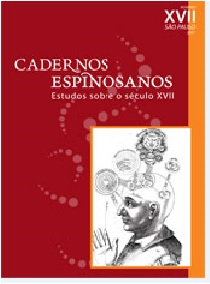Intersubjectivity and transindividuality from Leibniz and Spinoza
DOI:
https://doi.org/10.11606/issn.2447-9012.espinosa.2007.89324Keywords:
Spinoza, Leibniz, Transindividuality, IntersubjetivityAbstract
One of the greatest persistent misunderstanding around leibnizian philosophy is to think it as a sort of spinozism. Likewise, every attempt to show Leibniz and Spinoza as opposed to each other do not surpass the hegelian interpretation, according to which both philosophies are seen as antagonism between universality and individuality. Our aim is, on the contrary, to contrast one philosopher to another in respect to the matter of individuality and their relations to the XXth Century thinking: on the one hand, the husserlian intersubjectivity as the philosophical continuation of the Monadology; on the other hand, the simondnian concept of transindividuality, which upon the developments of Balibar turns the spinozian thought possible to be continued in contemporaneity. We intend to show the distance that keep both systems away one from another by means of an interpretation that do not simply repeat the old hegelian refrain.Downloads
Download data is not yet available.
Downloads
Published
2007-12-15
Issue
Section
Artigos
License
Autores que publicam nesta revista concordam com os seguintes termos:
- Autores mantém os direitos autorais e concedem à revista o direito de primeira publicação, com o trabalho simultaneamente licenciado sob a Licença Creative Commons Attribution que permite o compartilhamento do trabalho com reconhecimento da autoria e publicação inicial nesta revista.
- Autores têm autorização para assumir contratos adicionais separadamente, para distribuição não-exclusiva da versão do trabalho publicada nesta revista (ex.: publicar em repositório institucional ou como capítulo de livro), com reconhecimento de autoria e publicação inicial nesta revista.
Authors who publish in this journal agree to the following terms:
a. Authors retain copyright and grant the journal the right of first publication with the work simultaneously licensed under the Creative Commons Attribution License that allows to share the work with an acknowledgment of its authorship and initial publication in this journal.
b. Authors are authorized to take on additional contracts separately, to non-exclusive distribution of the article published in this journal (ex.: to publish in institutional repository or as part of a book), with an acknowledgment of its initial publication in this journal.
How to Cite
Morfino, V., & Souza, H. P. de. (2007). Intersubjectivity and transindividuality from Leibniz and Spinoza. Cadernos Espinosanos, 17, 11-42. https://doi.org/10.11606/issn.2447-9012.espinosa.2007.89324


